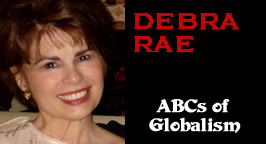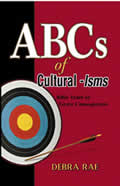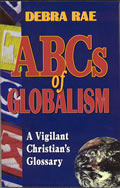THE
LOST ART OF CRITICAL THINKING
PART 4
By
Debra Rae
November 6, 2010
NewsWithViews.com
Part 4, PC Peace Bait
Having lived in the Middle East, and having traveled to a number of countries with sizable Muslim communities—e.g., Bahrain, China, Djibouti, Egypt, India, Iran, Iraq, Jordan, Kenya, Kuwait, Lebanon, Morocco, Oman, Russia, Saudi Arabia, Singapore, Spain, Syria, Thailand, Tunisia, Turkey, and the United Arab Emirates—I am intrigued by the study of Islam, and have been since 1971.
For this reason, recent comments by a self-described liberal Christian piqued my interest. By all accounts, this woman is both brilliant and churched; and I was curious to know what she had to say about a book I’d recently read—namely, How Islam plans to Change the World by Dr. William Wagner.[1]
Her take on Islam didn’t necessarily surprise, but it did unnerve me. “This particular book,” she complains, “breeds continued lack of acceptance of other religions and exacerbates a sense of Christianity by hate.” To hate is to dislike somebody or something so intensely as to evoke feelings of anger, hostility, or animosity. Hatred is synonymous with abhorrence, detestation, odium, revulsion, loathing, and the like.
These are uncharacteristically strong words for author Dr. Wagner, a mild-mannered, highly reasoned man who has devoted decades of his life to missions. I’m honored to have met him personally. For a bright, accomplished Christian woman to associate him with “Christianity by hate” inspired a closer look.
My intent isn’t to promote a book or its author, nor is it to disparage their critic. Rather, it’s to explore by this example the essentials of critical thinking without which we miss the mark, often with grave consequences following.[2]
A Critical Thinker Examines All Available Evidence Before Drawing Conclusions
In his critic’s words, Dr. Wagner spews “fabricated drivel with a bigoted agenda.” Again, very strong words, especially when scholarly research, as Dr. Wagner’s, boasts substantial appendices, extensive notes, credible bibliography, and even a glossary of terms, meanings for which are standard. Moreover, far from “fabricated drivel,” his research is backed by decades of on-the-ground experience among Muslims within their own communities.
By definition, a bigot holds intolerantly to a particular creed; he is small minded, obstinately devoted to his own opinions and prejudices. My observation to the contrary is that, in making his case, Dr. Wagner offers a meticulously documented overview of Islamic philosophy and methodology; plus, he includes writings from the secular press and quotations from Islamic writers.
A Critical Thinker Engages the Facts with An Open Mind
Folks are free to agree with Dr. Wagner’s critic that his book is somehow “misguided and misinformed.” However, to make that determination, one must actually read it. But, then, Dr. Wagner’s critic finds it “irresponsible of us to purchase a book like this.”
She further reasons, “There is nothing I have read in the Koran or any other books [that] suggests an Islamic plot to overthrow Christianity or our government.” This I don’t doubt. One such book this critic refuses to purchase or read is Dr. Wagner’s.
Pardon the cliché, but she appears to have judged his book by its cover. Apparently on that basis alone (perhaps reasonably so), she recognizes that the book’s worldview differs from her own. No problem here, but then she indicts that worldview for lacking “acceptance of other religions” and, even more, for challenging “another’s right to exist.” Her conclusion? For writing an exposé of Islam, Dr. Wagner must lack “confidence in Christianity.”
Mind you, this is the former vice president of the Southern Baptist Convention who, for more than three decades, served as missionary in Europe, the Middle East, and Africa. Besides teaching, Dr. Wagner travels extensively to train missionaries for ministry to Muslims—certainly not to challenge their very existence!
A Critical Thinker Bypasses Inflammatory Rhetoric
For ten years Dr. Wagner served as chair of the Muslim Awareness Committee of the European Baptist Federation. In communicating that awareness, Dr. Wagner avoids use of derogatory language. Consistently, within the context of his book, he employs Arabic terms, definitions for which are accepted as standard by Muslims themselves.
Inflammatory rhetoric—e.g., “Christianity by hate”—cannot possibly encourage “open minded dialogue … to gain perspective and perhaps build peace among peoples,” to use the precise words of this critic. Sadly, Dr. Wagner’s critic blatantly violates her own principle that the cause of Christ is best served devoid of “railing accusations.”[3]
Recently, a debate in front of a New York City audience was aired on NPR, its subject "Is Islam a Religion of Peace?" Participants included Ayaan Hirsi Ali, Douglas Murray, Zeba Khan, and Maajid Nawaz. At the beginning of this debate, only 25 percent of the audience accepted that Islam was not a religion of peace. By its end, that number had risen to 55 percent. Which goes to show that open-minded fact gathering makes a significant difference.
Ironically, had this critic engaged in open-minded dialogue regarding How Islam Plans to change the World, she might have been pleased with the fruitful outcome both in terms of fact-gathering and relationship-building.
A Critical Thinker Evaluates Before Buying Into Politically Correct Dogma
Author of Beyond Political Correctness, and professor at the University of Southwestern Louisiana, Dr. David Thibodaux astutely challenges the anti-logic of the PC mindset. Simply put, political correctness employs inequitable scales.[4] [Note: Book "Beyond Political Correctness" is out of print, supply is limited]
For example, it stands to reason that, in predominantly black cities, blacks are more likely to be arrested for crimes committed. This is not racial profiling, as some postmodernists contend. It is the law of probability. The same reasoning applies to the ummah, or community of those who affirm Islam. How so?
Take, for example, Jihad, Arabic word for struggle. Though it can reference holy war, the Hadith fingers spiritual self-improvement as the greatest jihad. Using this understanding to substantiate one’s belief that, in fact, Islam is a peaceful religion is common, but short sighted.
You see, of the over 100 allusions to jihad in the Qur’an, some 97% of them reference jihad’s primary meaning—that being, the spread and domination of Islam. Despite claims to the contrary, history demonstrates that the purported greater jihad (warfare against sin) takes backseat to the so-called lesser jihad (holy war).
A Critical Thinker Differentiates between Western Mentality and Eastern Thought
Perhaps unknown to our critic, the Qur’an to which she alludes was actually written in two cities on two separate occasions. 92 surahs (sections) written in Mecca advocate non-harm to “People of the Book” (Jews and Christians), but 24 sections written in Medina do not.
A Westerner might conclude that the vote’s in: non-harm, 92; harm, 24. The majority wins out. But not so fast, there’s no Arabic word for “democracy,” nor is there any functioning democracy in the Islamic world. Your vote and mine don’t count.
Instead, under dar-al-Islam, majority rule bows to the Islamic Doctrine of Abrogation, which elevates later doctrine (specifically, the Medina sections) over earlier ones (Mecca sections). That is to say, “harm” to non-Muslims trumps “non-harm.”
Harm isn’t limited to physical assault. Required to live under Islamic rule, conquered Jews or Christians (called dhimmi) are routinely shortchanged in the Islamic legal system (fiqh). Moreover, they are subject to the Pact of Omar requiring a burdensome yearly tax. None may witness to their own faith. In some cases, the conquered are relegated to slave status.
A Critical Thinker Presses Beyond Personal Experience and Bias
Having read nothing in the Qur’an, or any other books, suggesting “an Islamic plot to overthrow Christianity or our government,” Dr. Wagner’s critic lets slip her limited exposure.
She may not know that on average 160,000 Christians are killed every year because of their beliefs; and the most intense persecution of Christians takes place—not in the West, but rather in Egypt (90% Muslim), Iran (93.8% Muslim), Afghanistan (100% Muslim), and Sudan (70% Muslim).
Perhaps she’s not heard of the Wahabi movement, the ultimate goal for which is the ummah—specifically, a universal theocratic community affirming Islam. Nor does she grasp that some 80% of all Imams (spiritual leaders) in the United States are Wahabists whose mantra, by the way, is reform by the sword.
Facts as these are unsettling, to be sure, but a critical thinker presses beyond limited personal experiences and readily subjugates his bias to what’s real. In doing so, he guards against overgeneralizations—e.g., presuming wrongly that “all Muslims” advocate universal subjugation to the ummah by murderous force. They do not.
Critical Thinkers Define Their Terms
Generally speaking, “tolerance” suggests acceptance of differing views—specifically, in religious and political arenas. In PC speak, its lack signals “hate.” But think about it. Jesus did not tolerate hypocrisy; in fact, He openly called Pharisees “white-washed tombs” and “vipers.”[5] Nevertheless, to characterize Jesus as hateful is unthinkable, even to Dr. Wagner’s critic, herself a professing Christian.
I accept that it’s honorable to treat with fairness those whose worldviews differ from my own. In fact, America models this principle. While there is no single visible church of Muslim converts to Christianity in any Arab country, the United States nonetheless allows its seven million Muslims to worship freely in excess of 1,200 mosques.
Even so, in Christianity, vigorous contending for the faith is no option; it’s a biblical mandate.[6] A Christian’s charge is to proclaim unapologetically that Jesus is Who He said He is—the way, the truth, the life.[7] No one comes to the Father except by Him.[8] Clearly, His is no conciliatory gospel—nor is it imposed by the sword.
Yet were He to walk among us today, Jesus would surely be called closed-minded, intolerant, Islamophobic, bigoted, and hateful. Is it any wonder Christians who follow closely in His footsteps likewise bear those slurs?[9]
A Critical Thinker Employs a Reliable Plumb Line
To a fundamentalist Muslim, the fire of Hell is said to be seventy degrees hotter than earthly fire; and escaping it depends on the whim of Allah. While there is no variance or shadow of turning in the God of the Bible,[10] the god of Islam applies a shifting scale. In the words of Caesar Farah, “Allah may vary his ordinances at pleasure, prescribing one set of laws for the Jews, another for the Christians, and still another for Muslims.”
A Critical Thinker Does His Homework
True, ours is a culture of distraction. While literally on the run, we are constantly bombarded with flash images and media sound bites. Many tend to box up and file away fragmented tidbits of information that, when triggered, are conveniently retrieved without much thought. In failing to corroborate and evaluate sources, counter examples, and their consequences, they sacrifice due diligence.
Granted, there are appropriate times for mindless chatter and off-the-top-of-the-head judgments. Not every subject demands the discipline of critical thinking, but the nature of Islam is one subject that does.
| Subscribe to the NewsWithViews Daily News Alerts! |
Why is that? Highly organized and well funded, Islam boasts phenomenal growth. Already Muslims represent over half the populations of some 46 countries. If only a small fraction of its 1.3 billion adherents advocate militancy against infidels (some estimate up to 10-15% do), then it behooves any thinking person to explore the subject thoroughly.
Is Islam a peaceful religion? You decide—but first do your homework!
Click here for part -----> 1, 2, 3, 4, 5,
Footnotes:
1,
Dr. William Wagner, How Islam Plans to Change the World (Grand
Rapids, MI: Kregel Publications, 2004).
2,
The Greek word, hamartia, means “to miss the mark with
grave consequences following.” In the New Testament, it is used
as one of many Greek words for “sin.”
3,
Jude 9.
4,
Thibodaux, David, Ph.D. Beyond Political Correctness; Are There
Limits to This Lunacy? Lafayette, LA: Huntington House Publishers,
1994.
5,
Luke 3:7; Matthew 23:27.
6,
Jude 3.
7,
John 14:6a.
8,
John 14:6b.
9,
John 15:20.
10,
James 1:17.













 Share
This Article
Share
This Article







